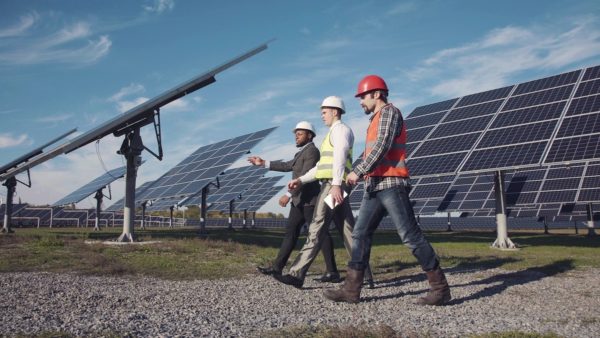The solar energy industry is expanding across the United States and beyond as more countries transition to renewable energy. In the U.S., 855,000 people were employed in the renewable energy industry either directly or indirectly in 2018. Over 240,000 of these people work in the solar energy industry, and this number is growing quickly.
The U.S. trails China and Japan in solar energy jobs, with China employing 2.2 million or 61% of the global total. Although solar jobs exist across the U.S., California, Florida, Massachusetts, New York, and Texas lead the way in solar industry jobs. To learn about the breakdown of solar jobs by location and sector, visit the Solar Job Census map. Reports for individual states highlight how many jobs exist in installation, manufacturing, distribution, and operations and maintenance. In most states, installation jobs lead the sector in total jobs.
If you are interested in entering the solar energy field, there are a variety of different careers available. Like any other industry, the solar energy industry needs dedicated professionals to help it thrive. Let’s look at some of the career options in solar energy.

Solar System Installer
Solar installers put solar panels on the roof and connect them to the electric panel. This job requires some training, which you can often get on the job, and general construction and electrical experience are helpful. Installation classes and training programs are available through solar manufacturers, solar organizations, or programs at community colleges and trade schools. Obtaining NABCEP certification could also help your career advancement as it the most recognized certification in the solar energy industry.
An ideal solar installer isn’t afraid of heights, is good at working with their hands, and can work outside in a variety of weather conditions. The job also requires the ability to do some lifting and use basic tools. Many of the same skills are needed to repair solar systems as to install them.
The median pay for an installer is $42,680, and the field is expected to grow rapidly in upcoming years. The Bureau of Labor Statistics expects a 63% increase in the demand for solar installers between 2018 and 2028. Because the solar industry is still relatively young, there are few solar installers in the industry with more than a decade of experience.
Although some states certainly lead the way in the solar energy industry, there are jobs in this field across the country, in both rural areas and cities. Like many jobs in the building trades, more men than women work in this profession. The industry needs quality solar energy installers to help maintain high standards.
Certified Electricians
Many solar installation contractors employ electricians, who often complete the inside electrical work associated with a solar energy project. Although the requirements vary by state, licensed electricians with solar energy knowledge are in great demand in many areas. Becoming licensed requires a certain amount of field experience working as an apprentice and passing a written exam. Most people attend a technical school or community college to gain electrical training and then gain on-the-job experience. A journeyman certification is easier to obtain and has lower requirements than the master license. Certified master electricians can supervise other electricians and they typically have a higher earning potential.
Prior electrical experience can help you break into the solar energy field. If you are a licensed electrician, this qualification will likely help your employment options. The current shortage of licensed electricians could become more severe with the predicted increase in jobs in this field.
The median pay for an electrician in 2018 was $55,200 and expected job growth between 2018 and 2028 is at 10%. Currently, the field is dominated by men. Because most electricians are certified through a state body, the license varies by state. This is unfortunate because it makes it more difficult to relocate to another state while keeping the same qualifications.
Marketing, Sales, and Business Professionals
Like any other type of business, solar energy installation companies need people to perform marketing and sales work. Marketing professionals write website copy, press releases, social media content, informational videos, and blog posts about solar energy. Salespeople survey properties for solar and design the solar system. This requires specialized knowledge of how solar energy works and properly sizing the solar system for the given property.
In many cases, solar salespeople also help educate the public about solar energy. To maintain high standards in the industry, it is important for installation companies to provide accurate information to the public. The most professional salespeople in this industry will also help inform potential customers if their property isn’t suitable for solar energy, perhaps due to shading.
Scientific Research
People in a range of scientific fields perform research and development to improve solar energy technology. Scientists are working to boost efficiency and reliability, lower costs, and improve aesthetics. Careers in solar energy research and development involve working in an office or laboratory, often in conjunction with a manufacturing facility. Chemists, physicists, and material scientists are helping to advance the field.
In some cases, a lead researcher requires a doctorate, but some workers may enter the field with a bachelor’s or master’s degree. Wages vary widely. Chemists make an average of $68,300, material scientists $84,700, and physicists $106,400, but this data isn’t specific to the solar energy industry.
This article was originally published on January 21, 2020.
The post Careers in Solar Energy appeared first on Earth 911.








